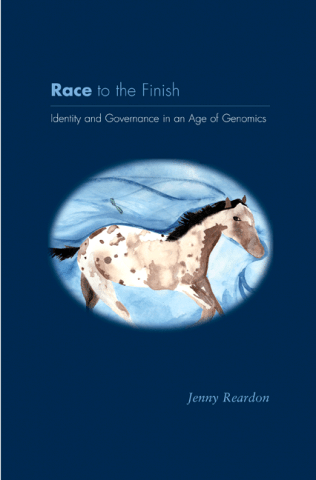Race to the Finish: Identity and Governance in and Age of Genomics
In the summer of 1991, population geneticists and evolutionary biologists proposed to archive human genetic diversity by collecting the genomes of “isolated indigenous populations.” Their initiative, which became known as the Human Genome Diversity Project, generated early enthusiasm from those who believed it would enable huge advances in our understanding of human evolution. However, vocal criticism soon emerged. Physical anthropologists accused Project organizers of reimporting racist categories into science. Indigenous-rights leaders saw a “Vampire Project” that sought the blood of indigenous people but not their well-being. More than a decade later, the effort is barely off the ground.
How did an initiative whose leaders included some of biology’s most respected, socially conscious scientists become so stigmatized? How did these model citizen-scientists come to be viewed as potential racists, even vampires?
This book argues that the long abeyance of the Diversity Project points to larger, fundamental questions about how to understand knowledge, democracy, and racism in an age when expert claims about genomes increasingly shape the possibilities for being human. Jenny Reardon demonstrates that far from being innocent tools for fighting racism, scientific ideas and practices embed consequential social and political decisions about who can define race, racism, and democracy, and for what ends. She calls for the adoption of novel conceptual tools that do not oppose science and power, truth and racist ideologies, but rather draw into focus their mutual constitution.
Available at Princeton University Press, 2004.
Reviews of Race to the Finish: Identity and Governance in and Age of Genomics
2007. Lisa Gannett. British Journal for the History of Science. Vol. 40 Issue 3, p462-464.
2007. Staffan Müller-Wille. “Diversity and Adversity.” New Formations. Issue 60, p158-161.
2006. Barry Barnes. ISIS: Journal of the History of Science in Society. Vol. 97 Issue 2, p383-384.
2006. Hilary Cunningham. American Anthropologist. Vol. 108 Issue 1, p256-257.
2006. Henk Van Den Belt. New Genetics & Society. Vol. 25 Issue 3, p343-349.
2005. Henry T. Greely. “Lessons from the HGDP? Review of Race to the Finish: Identity and Governance in the Age of Genomics by Jenny Reardon.” 308 Science 1554-1555.
2005. Luca Cavalli-Sforza. “Studying Diversity.” EMBO Rep. Aug 6(8): 713.
2005. Jonathan Marks. Quarterly Review of Biology. Vol. 80 Issue 4, p504-505.
2005. Diane Paul. “Diversity and Controversy.” Nature. Vol. 437 Issue 7059, p621-622.
Endorsements
“In this gracefully written, subtle, and thorough account of a failed scientific endeavor, Jenny Reardon effectively accomplishes several important goals. First, she tells a fascinating story of how a well-intentioned scientific effort to explore the diversity of the human species foundered on the shoals of controversy that sprung in part from the fundamental inability of scientists to apprehend the sociopolitical world in which their efforts were situated. Second, she illuminates her analysis with a theoretical perspective that emphasizes the simultaneous ‘co-production’ of social order and natural order. Third, Reardon is at the cutting edge of new work on race and science that seeks to understand the complex role of new sciences such as genetics in the remaking of racial classifications, identities, and politics. She does all this with impressive clarity, never losing sight of the appeal of the story itself.”—Steven Epstein, University of California, San Diego, author of Impure Science: AIDS, Activism, and the Politics of Knowledge
“This book ranks as the seminal history of the Human Genome Diversity Project. Jenny Reardon tells an entertaining and enlightening story of the very social and political field of human diversity research.”—Alan H. Goodman, President-Elect, American Anthropological Association, editor of Genetic Nature/Culture
